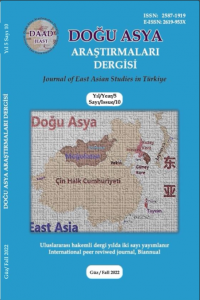Turkish and Turkic Studies in Korea : Focusing on the Academic Institutions and Scholars in Korea
Turkish and Turkic Studies in Korea : Focusing on the Academic Institutions and Scholars in Korea
These days economic relations between Korea and Turkic states are rapidly developing, however, academic relationship and cultural exchanges were less then expectation. Thus this paper tries to examine the current trend of Turkic studies in Korea and their activities which are creating a social and cultural bridge role between Turkic countries (mainly, Turkey, Azerbaijan, Uzbekistan, and Kazakhstan) and Korea. Many educational and research centers that is related with the Turkic Central Asian and Caucasus studies have been established by universities and private groups in Korea recently. These institutions and scholars are playing various role in bridging culture and society. Lastly this study examined the students’ motivation in selecting the Turkish or Turkic Studies in Korea. By doing so, this paper will try not only to introduce Turkey and Turkic Studies in Korea but also examine its future prospect and role.
Keywords:
turkish study, turkic study, korea, education, turkology, motivation culture,
___
- Baek, Sangki (2007). Living with Turkish People for Half a Century. Seoul: L&D Publishing.
- Chung, Yeon Sun (2005). Hankookaeseoeui mikookhak: Erongwa silje [American studies in Korea: Theory and practice], Seoul, HUFS Press.
- Dörnyei, Zoltán, and Ema Ushioda (2013). Teaching and Researching: Motivation. London: Rouledge.
- Emerging Economies Research Team (2013). “Strategies to Enter the Emerging Markets of Turkey and Uzbekistan”. Institute of Central Asian Studies, 34-38.
- Eom, Gu Ho (2012). “Research of Trends in Central Asian Studies in Korea”. Asia Review, Vol. 2. No.1, Seoul National University Asia Center, 121-152.
- Gardner, Robert (2007). “Motivation and Second Language Acquisition.” Porta Linguarum, 8, 9–20.
- Lee, Hee Soo (1989). “Trends in Turkish Studies”, Journal of Korean Studies, Vol. 64, Institute for Korean Studies, Yonsei University, 189-204.
- Lee, Hee Soo (1998). “Current Status and Challenges of Middle East Regional Studies”, Journal of Regional Studies of the Seoul National University, Vol.14, 155-186.
- Lee, Nan A (2014). “Turkish Literature: Research Trends and Translations in Korea”, Asia Review, Vol. 3. No.2, Seoul National University Asia Center, 161-185.
- Ministry of Patriots and Veterans Affairs (2007). Brother Nations of Korea and Turkey: History of Turkey’s Participation in the Korean War, Seoul.
- Oh, Chong Jin (2009). “Muslim Immigrants in Korea: Their Intermarriage with the Koreans and the Settlement”, Journal of Mediterranean Area Studies, vol.11, no.3, 79-115.
- Oh, Chong Jin (2009). “Marriage Migration of Central Asian Muslim to the Korean Society”, Korean Journal of the Middle East Studies, vol.30, no.1, 257-293.
- Oh, Chong Jin (2008). “Muslim Communities in the Korean Society: Focusing on the Influx, Adaptation, and Social Network of Muslim Immigrants in Korea”, The Journal of the Institute of the Middle East Studies, vol.27, no.2, 81-123.
- Oh, Chong Jin (2008). “The Present State and Social Network of the Central Asian Muslim immigrants in Korea: Focusing on Muslims from Uzbekistan, Kazakhstan, Kyrgyzstan, Turkmenistan, Azerbaijan, Tajikistan”, Journal of the Korean Association of the Islamic Studies, vol.18, no.3, 65-104.
- Schmidt, Richard [ed.] (2001). Motivation and Second Language Acquisition, Second Language Teaching & Curriculum Center, University of Hawaii.
- Semmar, Yassir (2006). “An Exploratory Study of Motivational Variables in a Foreign Language Learning Context.” Journal of Language and Learning, 5, 118–32.
- Suh, Jaemahn (1997). “Current Status and Challenges of Turkish Studies in Korea,” Journal of the Korean-Turkish Academic Society, Korean- Turkish Academic Society, Vol. 1: 6.
- ISSN: 2587-1919
- Yayın Aralığı: Yılda 2 Sayı
- Başlangıç: 2015
- Yayıncı: Abdürreşit Celil KARLUK
Sayıdaki Diğer Makaleler
Çin Siyasal ve Yönetim Sistemi Üzerine
Vietnam’ın Çin ile İlişkileri: Aşk ve Nefret
Turkish and Turkic Studies in Korea : Focusing on the Academic Institutions and Scholars in Korea
DENİZ GÜVENLİĞİ VE ÇİN ETKİSİ: ENDONEZYA'NIN GÜNEY ÇİN DENİZİ VE NATUNA ADALARI POLİTİKALARI
Moğolların Güneydoğu Asya Devletleri ile Siyaseti
